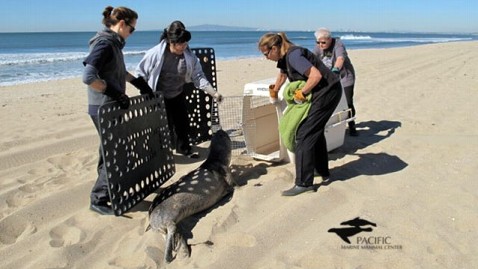18 California Sea Lion Pups Rescued in 48 Hours; Marine Mammal Center Declares State of Emergency

(pacificmmc.org)
After 18 California sea lion pups that were "pretty much skin and bones" were rescued in just 48 hours, coming in a year that has already seen more than 10 times the number of rescues last year, a California marine mammal center has declared a state of a emergency.
"They're coming in pretty much skin and bones and we're starting to see their systems shut down," Pacific Marine Mammal Center Executive Director Keith Matassa said. "It's unusual. Last year at this time we only had 10 rescues. We're up to 112 this year."
The Pacific Marine Mammal Center (PMMC), a non-profit organization located in Laguna Beach, Calif., rescued 12 sea lion pups on Saturday, marking the highest number of rescues in a single day ever recorded for their organization. The organization is currently caring for 86 animals, 84 of which are sea lions. Of those pups rescued over the weekend, several died.
"We are a hospital, not all the patients make it through," Matassa said. "Those animals are fully examined. We do a necropsy, basically an autopsy on the animal - take samples and try to find out what's causing them to die."
Officials at the center are unsure what exactly is causing the high number of pups to need to be rescued. One theory is that the mother sea lions are traveling further and longer to hunt for fish, spending more time away from their pups that rely on them for milk and fish.
"California sea lions spend a year to a year and a half with their mom," Matassa said. "These are eight to nine months old. They're still learning how to eat fish."
Matassa said the state of emergency leverages the center to more resources, including the necessary supplies and volunteers. While PMMC has had a record number of rescues, officials said rescues of pups have increased significantly up and down the entire Southern California coast. PMMC urges the public to be cautious if coming across a pup in need and provided specific guideline to follow.
"These pups are coming ashore to get warm and rest, and are hauling out of the ocean to survive. We encourage the public to keep their distance, call us to help identify the animal and location, and keep others away until we arrive," PMMC said in a press release.
"Being in the field for close to 30 years I see a lot of changes in the environment and how it's affecting the animals," Matassa said. "We just have to start taking interest in taking care of the ocean."